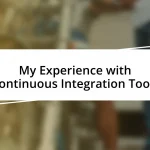Key takeaways:
- Collaboration between development and operations teams fosters a culture of shared responsibility, improving project outcomes and team relationships.
- Implementing feedback loops and blame-free environments encourages continuous improvement and empowers team members, enhancing overall productivity.
- Measuring success through both quantitative metrics and team morale provides a comprehensive view of DevOps effectiveness and promotes a culture of growth.

Understanding DevOps Culture Shift
The DevOps culture shift is fundamentally about breaking down silos in organizations. I remember the first time I witnessed this shift in action; teams that were once isolated began collaborating, sharing their insights openly. It’s exciting to see people from development and operations engaging in continuous dialogue, but I can’t help but wonder: what are the challenges they might face in this integration?
This shift doesn’t just change processes; it transforms mindsets. I often reflect on how adopting a more agile, responsive approach has not only improved product delivery but also increased job satisfaction among team members. When developers feel empowered to voice their concerns about operational hurdles, or when operations staff contribute to the development cycle, the energy in the room changes—it becomes one of shared ownership rather than blame.
Understanding this cultural transition means embracing a core belief: that collaboration leads to innovation. I find myself asking, how do we support this kind of collaboration? Tools and practices are essential, sure, but cultivating trust and communication seems to be the secret ingredient that allows teams to flourish in this new paradigm. It’s that emotional connection and shared responsibility that truly defines the DevOps culture shift.

Importance of Collaboration in DevOps
Collaboration is at the heart of DevOps, and I’ve seen firsthand how it can change the game. In my previous role, the development and operations teams were once like two ships passing in the night. But when we started hosting joint meetings, where both sides could share insights and express concerns, it was a revelation. This simple act of coming together ignited a synergy that previously seemed impossible, drastically improving our release cycles and elevating our project’s success.
When different teams collaborate, it fosters a culture of shared responsibility. I recall a specific project where developers began to see the operational impact of their code choices. By inviting operations into the development discussions early on, we were able to identify potential bottlenecks before they became major issues. This proactive approach not only reduced our stress levels but also saved the company significant time and resources. It’s fascinating to see how collaboration transforms the team dynamic into one that prioritizes collective success.
This shift to collaborative working doesn’t just benefit project outcomes; it enhances personal relationships within the organization as well. I have formed lasting friendships with colleagues I may never have connected with, all because DevOps encouraged us to build together. When we embrace collaboration, not only do we innovate, but we also create an environment where everyone feels valued and invested in the success of the project. How could we possibly overlook this powerful element?
| Aspect | Collaboration Benefits |
|---|---|
| Improved Communication | Fosters open dialogue and trust. |
| Shared Responsibility | Encourages ownership among team members. |
| Increased Efficiency | Reduces bottlenecks and enhances workflow. |
| Team Empowerment | Boosts morale and job satisfaction. |

Key Practices for Cultural Change
Cultural change in a DevOps environment requires specific practices to create an impactful transformation. One of the most effective practices I’ve encountered is establishing regular feedback loops. This means not just gathering feedback at the end of a project but incorporating it throughout the development cycle. In one project, we used short, iterative sprints, which allowed us to adjust our approach based on continuous input. I found this practice invaluable, as it created a sense of ownership that brought out the best in my team, fostering a culture where everyone felt their voices truly mattered.
Here are some key practices that can facilitate cultural change in a DevOps setting:
- Establishing a Blame-Free Environment: Encouraging open communication where mistakes can be discussed without fear fosters trust.
- Regular Cross-Team Workshops: Hosting collaborative sessions brings together different perspectives, enhancing team cohesion.
- Adopting Agile Methodologies: Implementing agile practices encourages flexibility in adapting to changes, making the team more responsive.
- Celebrating Wins Together: Recognizing both individual and team achievements cultivates a positive atmosphere, reinforcing shared success.
- Investing in Continuous Learning: Offering training sessions ensures everyone is equipped with the latest skills, promoting a culture of growth and adaptability.

Building a DevOps Mindset
Building a DevOps mindset is essential for transforming an organization’s culture. I remember when we started to encourage team members to embrace a growth mindset, which emphasizes learning and adaptability. It was eye-opening to witness my colleagues begin to see failures not as setbacks but as valuable lessons. I often ask myself, how can we genuinely innovate if we aren’t willing to learn from our missteps? This shift in perspective has fundamentally changed how we approach our work.
Another crucial aspect is cultivating empathy across teams. During a particularly challenging project, I set up informal “walk-a-mile-in-my-shoes” sessions, where developers spent time with operations teams. These interactions led to mutual understanding and even friendships that blossomed out of shared stories and challenges. It’s fascinating to see how empathy can break down barriers and enhance collaboration. Have you ever taken the time to understand another team’s challenges? The breakthrough moments that arise from such connections can be incredibly rewarding.
Ultimately, embracing continuous improvement in our processes is key to sustaining the DevOps mindset. I find that regularly reviewing our workflows with an open mind leads to brilliant enhancements that we might not have considered otherwise. For instance, after implementing regular retrospectives, we were able to streamline our deployment process significantly. How often do you reflect on your own practices? Making it a habit can lead to profound insights that propel team performance forward in a way that feels both exciting and rewarding.

Overcoming Resistance to Change
Resistance to change is often rooted in fear and uncertainty. I remember a time when I implemented a new automated testing tool, and there was significant pushback from my team. Initially, folks were apprehensive, worried about the learning curve and the potential disruptions it might cause. To address these concerns, I organized a hands-on workshop that let everyone explore the tool in a safe environment. What surprised me was how, after experiencing the benefits firsthand, my colleagues quickly transformed their skepticism into enthusiasm.
Another key approach I found effective is involving team members in the decision-making process. When considering a shift towards continuous integration, I sought input from my team about their preferences and concerns. This not only eased their apprehensions but also fostered a sense of ownership. Isn’t it amazing how empowering people can create a ripple effect of motivation and enthusiasm? The energy in the room switched from skepticism to collaboration, and I could see how invested everyone became in making the change successful.
Lastly, celebrating small milestones can significantly reduce resistance. I often highlight our minor victories during team meetings, ensuring everyone feels acknowledged for their role in the transition. For example, when we finally automated a previously tedious task, we took a moment to celebrate that success. It struck me how these little celebrations not only boosted morale but also instilled a collective mindset geared towards embracing further changes. Have you ever noticed how recognition can transform a team’s outlook? It’s those moments that really pull everyone together.

Measuring DevOps Success
To accurately measure DevOps success, I often rely on a combination of quantitative and qualitative metrics. For instance, monitoring deployment frequency and lead time for changes gives me a clear view of operational efficiency. However, I also pay close attention to team morale; after all, a happy team is typically a productive one. Have you ever noticed how enthusiasm can directly impact outcomes?
One of the most revealing measurements I’ve encountered is the change failure rate. Early in my journey with DevOps, I felt immense pressure to push updates quickly. Yet, I realized that tracking the percentage of changes which failed in production was just as crucial. It taught me that a slower, more deliberate approach often yields more robust results. Isn’t it fascinating how a single metric can shift your entire approach to development?
I also find that gathering feedback through regular retrospectives plays a vital role in assessing our progress. In one of my teams, we started integrating anonymous surveys to dive deeper into team sentiments. The insights were eye-opening; they not only highlighted areas for improvement but also celebrated our successes. How often do you take a step back to ask your team about their experiences? That feedback loop has become instrumental in refining our processes, ensuring we’re always evolving and improving.

Continuous Improvement in DevOps Culture
Continuous improvement is the heartbeat of DevOps culture. I vividly recall a time when my team began using Kanban boards to visualize our workflow. As we watched tasks progress from “To Do” to “Done,” it became a powerful motivator. Have you ever found that a simple visual can ignite a team’s energy? It was remarkable to see how clarity transformed our collaboration and encouraged us to continuously refine our processes.
One of the most rewarding aspects of embracing continuous improvement is the culture of experimentation it fosters. I remember when we decided to implement a two-week sprint review at the end of each cycle. Those sessions became more than just evaluations; they became a space for creativity and brainstorming. I often found team members eager to share their “failures” because they recognized these moments as stepping stones to greater innovation. Isn’t it fascinating how shifting the perspective on setbacks can fuel growth?
I’ve also learned that encouraging open dialogues about challenges leads to rapid improvements. During a particularly intense project, I initiated a “brown bag” lunch session where everyone could discuss hurdles they faced. The camaraderie and shared insights sparked new ideas that we would never have discovered in a standard meeting. Reflecting on this, I wonder how many other teams might thrive if they simply carved out time to talk openly about their struggles and triumphs. Continuous improvement thrives in those conversations, transforming obstacles into opportunities for growth.














